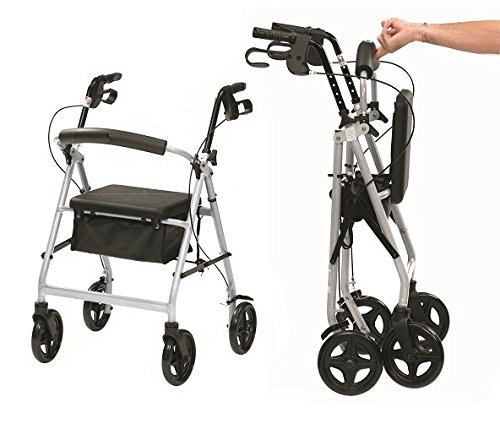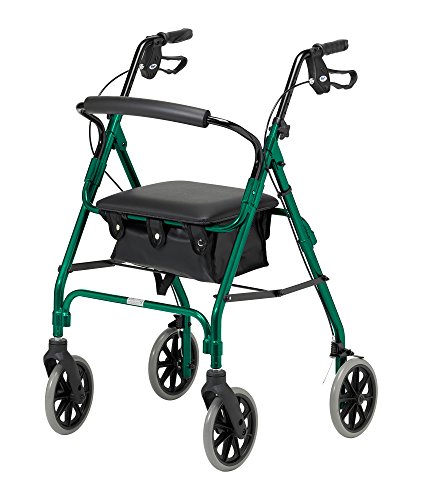See What Seated Rollator Tricks The Celebs Are Making Use Of
페이지 정보

본문
 The Convenience of a Sitting Rollator
The Convenience of a Sitting Rollator The seated rolling chair is compact and lightweight which makes it simple to transport and store. This allows seniors to enjoy their day-to-day activities and stay active in their community with newfound confidence.
The seated rolling chair is compact and lightweight which makes it simple to transport and store. This allows seniors to enjoy their day-to-day activities and stay active in their community with newfound confidence.Keeping a seated rollator in good condition is essential to ensuring safety. Regular inspections of the brakes and wheels can prevent accidents or breakdowns.
Stability
The frame of a rollator designed for seating is typically made from strong materials such as aluminum or steel. This ensures stability and long-term durability. The frame can also help support the weight of a user, making it easy to ensure their balance and stay upright when they are seated. This is essential for people with mobility impairments as they can sit and not have to find chairs or lean against something.
The most popular type of brake on a seated rollator is the cable loop brake system which functions similarly to brakes on bikes. Users have to squeeze the levers and handles simultaneously with both their hands to engage the brakes. When the brakes are activated they remain locked until the user is ready to release the levers and walk again. This kind of brake system is very useful for users, as it allows them to quickly and safely stop their rollator at any time in any setting.
The research suggests that seated rollators improve mobility stability in able-bodied, young people when the handle height is appropriately adjusted and positioned. This is due to a shorter preparation time for seat-off, as well as improved COPfeet as well as sway areas while standing up and sitting down. Additionally, it helps to maintain an upright posture when trying to maintain an upright posture. The stability of moving is due to the extra sensorimotor input that full rollator support can provide in comparison to touch, which only provides spatial clues through a tactile.
To use a seated rollator, stand close to it with your back against the seat and grab the handles to support yourself. To stop the seated rollator from moving away, ensure that the brakes are locked prior to moving forward. Relax and sit comfortably making sure that your feet are firmly in place under you. Once you're seated, slowly lean your body forward and hold the handles. This will allow you to shift your weight onto your legs. When you're ready to walk take off the brakes and align yourself between the rear wheels of the seated rollator.
Convenience
As opposed to a regular walker a seated rollator offers an integrated seat that can provide the support needed to rest in the event of need. This is especially useful for those who are required to stand for long periods during their daily routine. For instance sitting in the doctor's waiting room or grocery checkout line can be a struggle for people with mobility issues. By allowing them to sit down, a seated rollator can help them rekindle sources of enjoyment and independence that may have been out of reach without it.
Rollators are available in a variety of different styles to meet the needs of each user. They typically feature a lightweight but sturdy frame that can help enhance mobility, walking speed, and confidence in yourself. Aluminum is often used to make a light frame that has the strength needed for people with weight restrictions. A cushioned seat and convenient storage options are also commonly included on these mobility aids.
When evaluating a seated rollator when evaluating a seated rollator, it is essential to consider the height of the handles and seat. To determine the proper handle height, the user should wear normal shoes with their arms in front and their elbows bent slightly. This measurement will reveal the appropriate handle size to ensure maximum comfort and safety. The same method can be used to find the correct height between the floor and seat. The ideal height for a seat is one that allows the user to sit comfortably with their feet on the ground.
A seated rollator should have hand brakes in place to allow easy stopping and to help keep the device in control when it is not in use. They function similarly to the brakes on a bicycle and are easily activated by pressing the levers and handles simultaneously with both hands. Some models even include slow-down brakes, which provide additional security when you go downhill to stop the device from slipping away from the user.
To make life easier, a seated rollator can be fitted with a basket, which can be used to store personal items, groceries, or other necessities for shopping. These baskets are typically designed to fold with the unit, making it easy to carry and store when not in use. Also, walker trays or cup holders can be attached to the handles of a seated rollator to make it easy to access snacks and beverages while walking.
Safety
The safety of a seated rollator is dependent on the user's ability to maintain their balance and move the device in a safe manner. It is also crucial to be aware of the terrain, and to be cautious when using the device around curbs or driveways. The device's brakes should be secured before the user sits on the seat and deactivated when they are ready to stand.
One way to improve stability is to adjust the height of the handle so it matches the natural arm length of the user. This helps to reduce strain and promotes a better posture. Avoid leaning or hunching on the handles too much while walking. This can lead to fatigue.
Another consideration is the type of brake system that the device has. The majority of rollators with seats have brakes that lock. This is to ensure that the device won't slide away while the user is sitting. The most commonly used type of brake is a cable loop system which functions similarly to the brakes found on the adult bicycle. To activate the brakes, the user squeezes either one or both brake levers located on either side of their seat. This system is ideal for users who lack the strength to operate a pull-down brake or are susceptible to forgetting to activate brakes.
A seated rollator - Resource - can also provide the ability to rest while out in public, without having to search or fight for chairs which can be tiring and uncomfortable on joints that are sensitive. This feature is especially useful in crowd-filled areas such as stadiums and parks where finding seats at an appropriate height can be challenging.
The majority of rollators come with bags or baskets to store the essentials like food, medicines and personal hygiene products. Some models also come with an additional compartment underneath the seat for even more storage space. Many accessories are available on their own, including cups holder as well as a snack tray and bag organizer. Remember that unauthorised modifications or the use of non-original equipment may pose safety risks, and could invalidate any warranty that the device has. It is recommended that users consult the manufacturer or dealer regarding any modifications or enhancements they may be considering.
Customization
Rollators are available in different sizes and shapes to suit the requirements of different users. Three-wheeled models are usually the best option for those looking for an ultra lightweight rollator with seat-compact and lightweight design that is easily maneuverable in tight spaces. These models are also more mobile as they weigh less and have a smaller frame that is easy to fold and put into the trunk of a car.
Four-wheeled rollators have more stability than three-wheeled models and are the best choice for people with mobility challenges that are more difficult. Their four wheels equally distribute weight and permit them to maneuver over different terrains indoors and outdoors. These models also come with seats so that passengers can relax on longer trips.
Some 3 wheel rollators with seat have storage spaces that can be used to store personal items. This lets users be mobile and not have to return to their vehicle to pick up additional supplies. The storage options can even be a handy method of keeping daily essential items within reach, reducing the risk of falling while reaching to get something from a remote location.
Users of the Rollator can also personalize their device by adding features and accessories. This could include a bag or basket to transport snacks, medications or other things and can help to keep them organized when traveling. Some rollators come with brake handles that are designed ergonomically to ease hand pressure and let the user manage their device easily and some even come with a locking mechanism for parking or stopping the unit.
Rollators can be adjusted to suit the height of their users. The knob permits quick and easy adjustments. This makes it easy for anyone to pick the height they prefer. There are also a variety of hand-brake designs, including loop-lock brakes which require the hands of the user to be put through the tough loops of plastic on the handlebars, or push-down brakes that are similar to bicycle brakes. Some manufacturers also have barsiatric models with larger seats for larger-framed users.
- 이전글Why All The Fuss About Testing For ADHD? 24.12.22
- 다음글10 Things You Learned From Kindergarden That'll Help You With ADHD Uk Medication 24.12.22
댓글목록
등록된 댓글이 없습니다.

